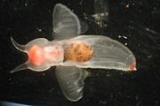
Sea angel
Overview
Sea angels previously known as one kind of pteropod, are a large group of small swimming sea slugs in six different families. These are pelagic marine
opisthobranch gastropod molluscs in the clade
Gymnosomata within the larger clade Heterobranchia
.
Sea angels are also sometimes known as "cliones", but this is potentially misleading because the family Clionidae
is just one of the families within this clade.
Recent molecular data suggests that the gymnosomata form a sister group to the Thecosomata, other planktonic, weakly or non-mineralized gastropods, although this long-standing hypothesis has had some recent detractors.
In this clade
, the foot of the gastropod has developed into wing-like flapping appendages (parapodia) and their shells have been lost.
Marine (ocean)
Marine is an umbrella term. As an adjective it is usually applicable to things relating to the sea or ocean, such as marine biology, marine ecology and marine geology...
opisthobranch gastropod molluscs in the clade
Clade
A clade is a group consisting of a species and all its descendants. In the terms of biological systematics, a clade is a single "branch" on the "tree of life". The idea that such a "natural group" of organisms should be grouped together and given a taxonomic name is central to biological...
Gymnosomata within the larger clade Heterobranchia
Heterobranchia
Heterobranchia, the heterobranchs or Euthyneura, is a taxonomic clade of snails and slugs, which includes species from the sea, the land and freshwater; marine, aquatic and terrestrial gastropod mollusks....
.
Sea angels are also sometimes known as "cliones", but this is potentially misleading because the family Clionidae
Clionidae
Clionidae is a family of sea angels, which are a group of pelagic marine gastropods.They are shaped a little like angels, and have flapping "wings", hence their common name. They are gelatinous, mostly transparent pteropods, and they only have shells in their embryonic stage...
is just one of the families within this clade.
Recent molecular data suggests that the gymnosomata form a sister group to the Thecosomata, other planktonic, weakly or non-mineralized gastropods, although this long-standing hypothesis has had some recent detractors.
In this clade
Clade
A clade is a group consisting of a species and all its descendants. In the terms of biological systematics, a clade is a single "branch" on the "tree of life". The idea that such a "natural group" of organisms should be grouped together and given a taxonomic name is central to biological...
, the foot of the gastropod has developed into wing-like flapping appendages (parapodia) and their shells have been lost.
Unanswered Questions

